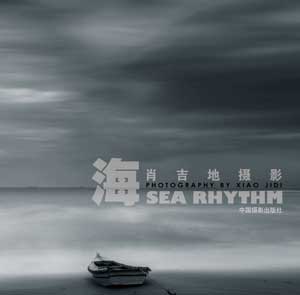海

出 版 社:中国摄影出版社
作 者:肖吉地
编 者:肖吉地
责任编辑:魏长水
出版日期:2012.12
开 本:12
印 次:2013年1月第一次
所属类别:摄影摄像
定 价:280.00
ISBN: 978-7-80236-852-1
内容提要
海 问
在有次评选会上,我惊异地看到了肖吉地先生关于“海”的摄影作品,映入眼球的那些照片让我不知所云,随后脑海里闪现出伟大诗人屈原《天问》中的许多诗句……顿时,我恍然大悟,啊,这不是“海问”吗?
时过半年,肖先生要出本摄影集,并邀我写个小序,我二话没说,欣然满口答应下来。不久他交给我70幅作品小样,说是今年62岁,就出一本62幅作品的画册吧。我以为,人过甲子,卸甲耕海,回报自然,出本画册,理所当然。于是我和作者商量,把这些宝贝照片分成《海岸》、《海问》、《廊桥久梦》、《远方》四个章节。所谓“海岸”实为画册的引言,空灵简洁。有“因”的含义,有“海”“天”同工概念,也隐藏了摄影者“无为”哲学理想。
第二章节“海问”是本画册的主体,有诸多“果”的元素。它是人与海、人与物的关系,更是物与海的关系。这些作品,有典型的现代美学意义,如诗如歌,画内画外全是故事,让人思考,让人百思不解。不管您用什么方式解读这些作品,都会有作者生活时代的影子,包括作者人生道路、经历和思想、情感,时而童趣,时而暮舞,时而欢乐,时而悲伤,时而辉煌,时而沧桑……这类罗列也只不过是一般情况下对艺术作品的赏析和推理。然而最值得关注的是那些含蓄、荒诞、隐喻背后的说道,海究竟要问什么也就不言而喻了。
为了加固这个主题,作者调动了多种造型手段。但不管哪种都是严肃,认真的,原创性的。其一,抽象的纯黑白影调体现了摄影经典语言独特魅力。其二,长时间曝光,让水上漂浮物隐去,加强了拍摄主体的凝固性,给人留下深刻视觉印象,独立(孤独)的物象(器物),成功地转换成一种特定的语境。不仅如此,作者还采取文学和艺术里惯用的重复或是排比的表现形式,从而极大地加强类同物象的重量感,强烈的节奏给观者留下了音符、音阶、音节的天籁之声。值得一提的是,作者不管用哪种形式和方法,始终把握了摄影的第一本质语言:客观、真实。做到不摆、不导、不改,一气呵成,难能可贵。更加体现出作者对摄影的自重、自强、自信、自律的信念。
第三和第四章节实际是一回事,只不过是一种传统的编辑方式。第三章节说的廊桥梦,这个世界许多人的梦,更是中国人的久梦。长期生活在海边的人们总有一种与海和谐相处的夙愿,毫无疑问,廊桥即是古今中外最好的对话、交流、联系模式。
第四章节“远方”,表达的是一个“蓝色”大符号(即世界)的概念,它是人类大都能理解的“世界语”,显然灯塔是这个“世界语”的响亮强音。
现在似乎可以把第九届中国摄影金像奖评委评语借拿过来,以示权威人士对他作品的肯定:“肖吉地的作品以静谧、柔美、简洁、空灵之美,赢得了评委们的认可。统一的黑白色调,宛如作者心中流淌的岁月诉说,慢门拍摄的流动之水,似雾似云,如梦如幻,营造出水墨画般的意境,格调清新而高雅,美在意境,美在气度。肖吉地作品中的海,景致辽远,静若止水;作品中的马,情致高洁,天地精灵。他拍摄的是景与物,敞开的是心与境。”
谨以为序。
2012年初冬于京城东郊
Questioning the Sea
Once at a meeting, I was surprised to see Mr. Xiao’s photographs about sea which at first made me a little confused but soon reminded me of the poetry Questioning the Sky by the famous Chinese poet Qu Yuan. Suddenly, I understood that the photographs delivered the meaning which is questioning the sea.
Half a year later, Mr. Xiao asked me to write a preface for his photograph album to be published. I readily agreed with no doubt. Later, he gave me 70 photographs and said he wanted to publish a photo album with 62 photographs for his 62 years old. I thought it was a good idea for a man over 60, who was retired to publish such a photo album, which came from nature and gave back to it. So I discussed with the author to divide these photographs into four chapters called Seacoast, Questioning the Sea, Long Dream in Bridge, Remote Area. Being the introduction of the album, the first chapter, which is ethereal and concise, carries the meaning of cause and also the concept of sea and sky. At the same time, it implies the philosophy ideal non-action of the photographer.
The second chapter is the main part of the book, containing the factors of the result. It shows not only the relationships between human and sea, human and things, but also things and sea. These works, telling stories in and out of the pictures, has typical modern aesthetics meaning, is like poem and song, making the readers think but can’t draw a certain conclusion. There are reflections of the era when the author lives, including his life, experiences, thinking and emotions, no matter in which way one comprehends. The pictures are the mixture of childishness and mature, glum and glee, glorious and vicissitudes. Except the descriptions above, which are the common appreciation and illation, the meanings behind the indirect, absurd and allusive pictures, which answer the questions of the sea, deserve the highly attention.
In order to reinforce the subject, Mr. Xiao uses several modeling methods. All of them are solemn, serious and original. Firstly, the abstract black-and-white images represent the unique charm of photographic language. Secondly, the longtime exposure, which
makes the floater faded out, intensifies the solidification of the subject, giving us deep impression. The lonely obstacles successfully transfer into the certain context. Moreover, the reduplicated and parallel structures that the author uses, usual tactics in art, strengthen the weight of the image. And these methods show the strong rhythm that leaves us musical note, syllable, gamut which seem to be the sound from heaven. What is more, essential language of the photography which are objective and real are always stuck to in any above ways. It is commendable that the photographer takes pictures without setting up and revising. This represents the author’s faith in photograph which is self-respect, self-reliance, self-esteem and self-control.
The third chapter and the forth one are nearly the same, but divided into two parts because of the traditional way of edit. The third chapter says the dream in the covered bridge. It is the dream not only for people all over the world, but also for the Chinese that live harmonious with sea. With no doubt, the covered bridge is the best approach for people at all times and in all countries.
The fourth chapter, Remote Area, expresses the concept of the big blue symbol (the world), which is the language for people all over the world. Obviously, the lighthouse stands for the strong voice of that language.
Now, I want to quote the comments from the judges in the 9th International Photography Awards, which reflects the endorsement of the authorities. They said, the works of Mr. Xiao wins the recognition of the judges, because they are quiet, gentle, ethereal and concise. The black-and-white image is like the narration of the past time the author underwent. The slow speed synchronization made the flowing water like cloud like mist, like dream faraway, creating the mood as Chinese painting. The fresh and elegant style creates the beauty in mood and generosity
The sea in Mr. Xiao’s works is vast and still, the horse is noble and spiritual. What he shoots are landscapes and objects but what he opens are minds and sprites.
Chen Changfen
early winter of 2012 in Beijing suburb
目录
